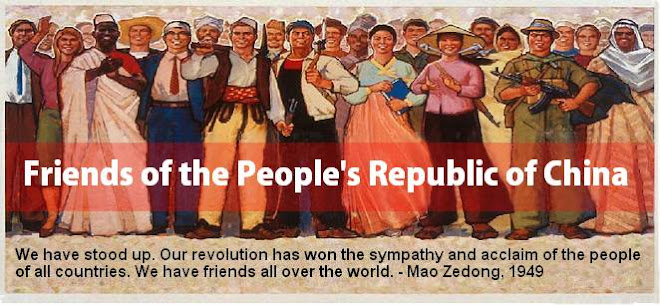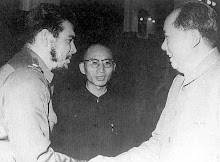
Afghanistan being admitted into the Shanghai Cooperation Organisation (SCO) as observers is a positive move for peace in the region. Afghanistan's only chance of any semblance of stability, territorial integrity and people-centred development is for it to escape the clutches of the imperialists and develop positive relations with its regional neighbours.
But this is exactly what nato fears, and nato is frantically trying to cajole and bribe and prepare the Taliban and other factions in Afghanistan for continued war against the SCO countries once nato draws down its occupation by 2014.
The negotiations with the Taliban and nato are, one can be sure, around exactly these issues. The fact that nato has opened a Taliban office in one of the most slavish statelets - Qatar (also host to the yanks biggest military base in the region) - shows the bribery that is taking place towards the Taliban.
It remains to be seen what splits will occur if any amongst the Taliban, perhaps some elements of the Taliban will not want to do the bidding of the west, but if the Arab revolts are anything to go by, one cannot be sure, but on the other hand perhaps the Afghan patriots can prove they are not slaves like so many Arab organisations currently in the nato-managed counterrevolution going on in Libya and Syria today.
At the same time, one can be sure that the SCO countries are also in negotiation with all sections of the Afghan political spectrum, including those who have and are fighting nato, and Russia like nato has a long history of involvement in Afghanistan, and will have learnt all manner of lessons in order to defend Afghanistan and itself for nato aggression and dirty tricks.
In the article below you can already see the imperialist reflex to divide and rule when the article plays up some wishful thinking divisions between the Russians and Chinese on Afghanistan:
"Moscow also has offered generous assistance to rehabilitate Soviet-era dams and power stations and is exploring natural gas exploitation and infrastructure contracts — putting it on a potential collision course with China."
There is no sign for the time being that China and Russia are on any kind of collision course about any issue of politics, let alone Afghanistan. But our side in the Global South should be constantly aware and assertively counteracting divide and rule strategy and tactics of our enemy.
Watch this space, as we may yet see a even more intense re-run of the war in Afghanistan if nato gets its way. On the other hand, one hopes that the SCO and other nations of the Global South can help Afghanistan to fend off the imperialists and finally start nation building.
Sukant Chandan, Sons of Malcolm
Central Asia group admits Afghanistan as observer
[source]
BEIJING – China, Russia and four Central Asian states granted Afghanistan observer status in their regional group Thursday, moving to consolidate ties with the impoverished, war-torn nation before most foreign combat troops depart by the end of 2014.
Chinese President Hu Jintao announced the plan at the Shanghai Cooperation Organization's annual summit in Beijing.
Russia and China have long seen the six-nation group as a way to counter U.S. influence in Central Asia, and hope to play a significant role in Afghanistan's future development, especially in economic reconstruction. Granting Afghanistan observer status will strengthen their contacts, something Beijing and Moscow hope will dilute U.S. influence and more closely align Kabul's policies with their own aims.
The SCO also recommitted itself to closer security and economic ties and to combating drug trafficking, extremism and terrorism.
"All the member states should implement the agreement on striking the three forces of terrorism, separatism and extremism," Hu told other leaders at a morning session. "We should establish and improve a system of cooperation in security and take coordinative actions to narrow the space of activities of the three forces, get rid of drug deals and other organized cross-border criminal activities."
Afghanistan, whose president, Hamid Karzai, attended the summit, joins India, Iran, Mongolia and Pakistan as SCO observer states. The group also admitted Turkey as one of its three dialogue partners.
Granting observer status aims to strengthen "political, economic and civilian cooperation between the SCO states and Afghanistan," Vice Foreign Minister Cheng Guoping told reporters.
Underscoring China's growing economic dominance in Central Asia, Hu opened the summit by saying China would offer a $10 billion loan to support economic development and cooperation among SCO member states. No details were immediately given on how the money would be used.
Despite the warming political ties, the SCO has yet to declare a unified strategy on Afghanistan and shows little sign of filling the void left by the withdrawal of U.S. and other foreign forces.
Already, Russia and fellow SCO member nations Uzbekistan, Kyrgyzstan and Kazakhstan are doing their part to ensure an orderly NATO withdrawal from Afghanistan, having agreed to allow the reverse transport of alliance equipment after Pakistan shut down southern supply routes six months ago.
The fourth Central Asian member of the SCO is Tajikistan.
The NATO pullout will also prompt the end of military operations out of Kyrgyzstan's Manas air base, fulfilling China and Russia's oft-stated opposition to a permanent U.S. presence in Central Asia.
While the SCO's security plans in Afghanistan remain unclear, economic outreach looks set to lead the way.
Firms from China — the world's second-largest economy — already have moved into Afghanistan, where officials hope that vast untapped mineral deposits will help offset the loss of foreign aid once foreign troops withdraw. China shares a small stretch of border with Afghanistan.
The U.S. Defense Department has estimated the value of Afghanistan's mineral reserves at $1 trillion. Other estimates have pegged it at $3 trillion or more.
In December, China's state-owned National Petroleum Corp. signed a deal allowing it to become the first foreign company to exploit Afghanistan's oil and natural gas reserves. That comes three years after the China Metallurgical Construction Co. signed a contract to develop the Aynak copper mine in Logar province. Beijing's $3.5 billion stake in the mine is the largest foreign investment in Afghanistan.
China's government has also helped train and equip some security units and government offices, invested in infrastructure, healthcare and education, and offered scholarships to Afghan students.
Russia, which lost nearly 15,000 troops in its disastrous 1979-1989 invasion and occupation of Afghanistan, appears keen to recover some of its lost influence there. A key concern for Moscow is stemming the flow of heroin into Russia, to be met by increased intelligence work in the country and bolstered border security in surrounding states.
Moscow also has offered generous assistance to rehabilitate Soviet-era dams and power stations and is exploring natural gas exploitation and infrastructure contracts — putting it on a potential collision course with China.





